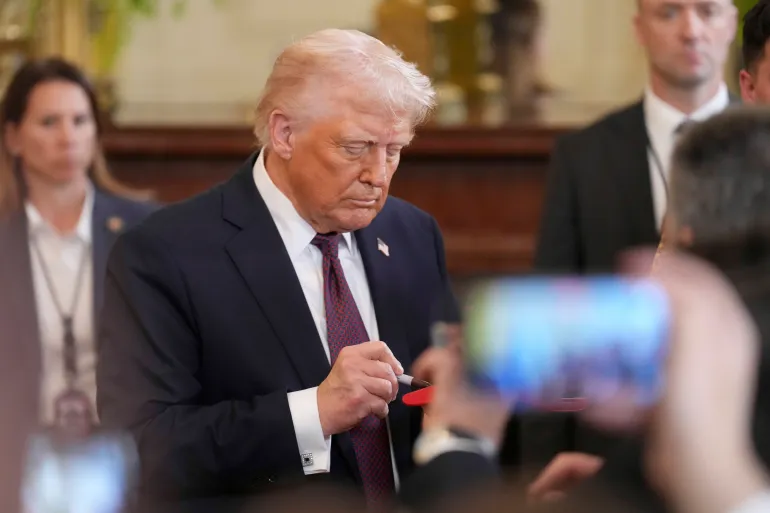President Trump declared on Friday that he revokes Harward’s Tax Exemption status would expire because he planned to use the IRS against the world-renowned university to create major financial issues for its operations.
The tax-exempt status for Harvard University will be removed. It’s what they deserve!” He posted this message through his social media platform.

The I.R.S. ‘s movement toward revoking Harvard’s tax-exempt status remained opaque at that time because it requires extensive institutional procedures.
The U.S. prohibits presidential intervention for I.R.S. tax inquiries thus all such orders trigger reporting requirements at the I.R.S. inspector general.
President Renews Threat to Revoke Harward’s Tax Exemption Status
Mr. Trump announced his desire for Harvard to lose its tax exemption last month which led White House officials to state that the I.R.S. would decide independently of the matter.
A request for comment from spokespeople at the Internal Revenue Service as well as the Treasury Department under which the tax collector operates returned no response.
Also Read: Donald Trump is looming over Australia’s election
Strictly according to law Harvard has no need to revoke their tax-exempt status as such drastic action would damage Harvard’s current and future educational operations, said the university through official remarks.
The tax-exempt status allows Harvard University to evade significant tax responsibilities while donors receive tax benefits from their institutional contributions. A loss of tax-exempt privileges would force Harvard to pay taxes and cause donors to receive fewer contributions.
Harvard generates operating revenues from donation-based gifts making up 45 percent of total revenue while the $53 billion endowment generates most donations.
You May Like to Read: Donald Trump’s first 100 days Report Card has shown significant disorder.
Evaluating Harvard University’s dispute with the Trump administration exists as part of a nationwide effort to induce change at elite universities whom the White House classifies as places containing antisemitic behavior requiring government oversight.
Harvard has entered an aggressive stance against the Trump administration’s actions during the previous several weeks.
The university denied several government demands which demanded reports to Washington and structural changes to its admissions and hiring procedures while seeking independent evaluation of university departments.
Federal authorities threatened to freeze $2 billion in federal funds for Harvard after the university refused to comply with executive demands thus leading the institution to initiate legal action.
The Trump administration started using the I.R.S. as a political instrument before it officially demanded Harvard University to lose its tax exemption status.
An issue in taxpayer information protection occurred because Trump officials pressed the I.R.S. to help ICE with deportation duties even though this went against legal guidelines.
The unauthorized disclosure of taxpayer information from I.R.S. employees results in possible imprisonment because it includes audit status as well as additional details about the data.
Treasury Secretary Scott Bessent has accused Mr. Elon Musk selected an acting commissioner who later appointed Michael Faulkender as deputy Treasury secretary and made him the current acting commissioner of the agency. The fifth commissioner leadership position of this year belongs to Faulkender.
During the Obama administration Republicans conducted investigations to demonstrate how the I.R.S. discriminated against Tea Party organizations along with other conservative groups.
The inspector general established through investigation that the agency had implemented improper procedures against conservative and liberal organizations.
According to Scott Hodge who led the Tax Foundation until recently the Republicans should exercise careful restraint when employing I.R.S. actions against particular sectors or specific organizations like these non-profit groups.
Any attempt to use the I.R.S. as a weapon constitutes wrong conduct. The establishment of tax policies needs to follow strict uniformity with absolute neutrality based on tax principles.
Democratic Senator Chuck Schumer from New York along with his colleagues wrote to the Tax Administration watchdog at the I.R.S. Treasury to investigate Mr. Trump’s selective approach to disordering Harvard University’s tax-exempt status.
According to these senators “the I.R.S. receiving presidential orders for assessing tax-exempt groups violates constitutional laws as well as federal regulations.”
The Internal Revenue Service performs lengthy audits to verify the tax-exempt status of groups although the process usually begins with challenges to the entity’s tax-exempt character. Groups whose I.R.S. tax exemption status faces revocation and can file appeals through judicial channels.
The broad scope of research and education activities at Harvard University creates a strong basis for tax professionals to forecast that the court will rule in favor of the institution.
Presidential Under Secretary Ted Mitchell from the Obama administration expressed to the public that he had already experienced this situation.
The president has maintained this position for numerous weeks. The current situation neither generates any new ability nor does it authorize him to independently regulate nonprofit standing for individual educational institutions.
The Republican Party plans to increase a tax on university endowments which they introduced during 2017 even if the IRS fails to alter Harvard’s tax standing.
